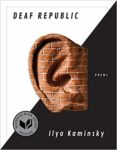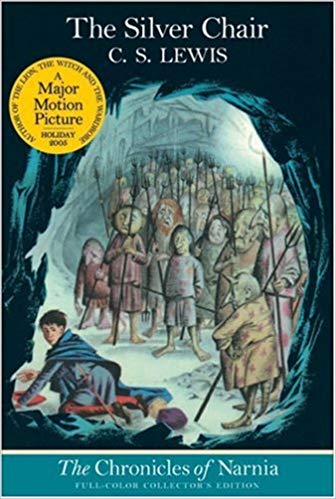Editor’s note: We’re reading The Silver Chair together this month. If you’re just joining us, be sure to read the Introduction, Part 1 (The Horrible Errors of Childhood), and Part 2 (The Circus Won’t Find the Park).
_______
For it is important that awake people be awake,
or a breaking line may discourage them back to sleep;
the signals we give — yes or no, or maybe —
should be clear: the darkness around us is deep.
— William Stafford, A Ritual to Read to Each Other
When our young travelers and their Marsh-Wiggle guide found themselves in a crumpled heap at the bottom of — what would you call it? A tunnel? A cave? Let’s go with underground cavern — they were bruised, battered, bloody. But they were also still alive. And they were together. They had, for possibly the first time since their perilous journey began, recognized their need for each other, had actively acknowledged they were in this together. They had miraculously survived the brutal tumble down the rocky slope, but they also found themselves still in the dark.
Before long, they were met in that dark by a thick army of Earthmen who marched them down endlessly long tunnels until they reached a grim channel where they would travel by boat.
Out of that cave they passed into another, and then into another and another, and so on till Jill lost count but always they were going downhill and each cave was lower than the last until the very thought of the weight and depth of earth above you was nearly suffocating. At last they came to a place where the Warden commanded his cheerless lantern be lit again. Then they passed into a cave so wide and dark that they could see nothing of it except that right in front of them a strip of pale sand ran down into still water. And there, beside a little jetty, lay a ship without mast or sail but with many oars. They were made to go on board her and led forward to the bows where there was a clear space in front of the rowers’ benches and a seat running round inside the bulwarks.
“One thing I’d like to know,” said Puddleglum, “is whether anyone from our world—from up-a-top, I mean—has even done this trip before?”
“Many have taken ship at the pale beaches,” replied the Warden, “and—”
“Yes, I know, interrupted Puddleglum. “And few return to the sunlit lands. You needn’t say it again.”
The darkness around them, there in the Underworld, so far from the world above the earth’s surface that it could be easy to forget it existed at all, was indeed deep.
A long time later, maybe days on the ship (they could no longer tell), they reached a sort of underground palace where they met the same dark knight they had seen on the road, the knight whose lovely companion had sent them to the giants for the Autumn Feast.
They dined with the man, who seemed kind enough, if not quite condescending. By the time dinner had ended, they were grateful for the food and the reprieve, but they also rather disliked the man. He seemed void of original thought, prone to reciting talking points as though his mind were not fully his own anymore, if ever it had been.
Still, there was something. The occasional flash across his eyes, a surprising wistful moment from time to time. The three stayed curious enough that when the knight asked them to stay for his nightly episode—the hour each evening when he would be bound to an ornate silver chair for, as he explained, his own protection as well as that of those around him. To hear him tell it, for that one hour each evening, he was bewitched. He suffered a terrible enchantment in which he was a danger to all around him. He asked his new friends to stay and made them swear on all they held dear not to release him no matter what he said or how desperately he begged.
As things would ultimately go, this was the first chance they had, very unexpectedly, to not muff a Sign when in the throes of his supposed terrifying enchantment—it was, in fact, quite terrifying but not for the reasons they had expected—the knight begged them in the name of Aslan to unbind him.
It will not surprise you to hear they nearly muffed it anyway, so caught up in debating whether the entreatment was a ploy or whether it could be trusted as truly the fourth Sign. They finally relented, unsure of whether they were about to be devoured by a horrible monster as they had been warned. He did not, in fact, devour them once he was free. He did, instead, reveal himself as none other than the long lost Prince Rilian, son of King Caspian the Tenth, and the whole aim of their journey. The enchantment, we learn, was not for a dreadful one hour each day, but rather for 23 hours each day, and for one hour he was sane, though unable to set himself free.
Rilian immediately destroyed the chair, and before they had a chance to plan their escape, the Witch—the very same Lady of the Green Kirtle who sought to have them eaten by giants—returned from her travels to inspect the progress of a construction project underway to open a passageway to the Overworld which would enable the Knight to conquer the unsuspecting earth dwellers.
The Witch was surprised to find the prince free and quickly made her own plan to re-enchant him as well as his new friends. She sweetly invited them all to sit around a fire and threw a magic powder (green, of course) onto the flames. While she strummed a mandolin, the music, the incense and her voice became an intoxicating combination that served to lull the group into a sleepy haze. But the sleep was not the worst part. Dozing off so the earthmen could imprison them, maybe execute them, was one thing. But all the while she was strumming, she was changing the truth for them, creating a new reality in their minds that made the reality of their lives before the darkness set in nothing but a dream. That is, until Puddleglum had a sudden burst of Marsh-Wiggle clarity.
“I don’t know rightly what you all mean by a world,” he said, talking like a man who hasn’t enough air. “But you can play that fiddle until your fingers fall off, and still you won’t make me forget Narnia; and the whole Overworld too. We’ll never see it again, I shouldn’t wonder. You may have blotted it out and turned it dark like this, for all I know. Nothing more likely. But I know I was there once. I’ve seen the sky full of stars. I’ve seen the sun coming out of the sea of a morning and sinking behind the mountains at night. And I’ve seen him bring up the midday sky when I couldn’t look at him for brightness.”
Cheered, they all revived, if briefly, and remembered their world, remembered their truth.
But the Lady of the Green Kirtle was wily. And she soon lulled them back, engaging with a relentless but cordial sincerity, asking them about the world they were so insistent about, looking for evidence of this sun (which seems suspiciously like a fanciful version of her lantern) and this great lion (who, of course, could be nothing more than chimerical copycat of her own cat. Even when not partially enchanted, and even before the Internet, it is hard to withstand an effective sealioning (a rhetorical technique of which the Lady of the Green Kirtle could have been the creator), and soon our would-be heroes had all started to succumb afresh. The Witch nearly had them giving up, denying the truth they knew and submitting to this new reality in the darkest of places when Puddleglum had another great burst of will, and at great peril, risked life and literal limb to break them from the spell.
The Witch shook her head. “I see,” she said, “that we should do no better with your lion, as you call it, than we did with your sun. You have seen lamps, so you imagined a bigger and better lamp and called it the sun. YOu have seen cats, and now you want a bigger and better cat, and it’s to be called a lion.”
[…]
“There is no Narnia, no Overworld, no sky, no sun, no Aslan. And now, to bed all. And let us begin a wiser life tomorrow. But first, to bed; to sleep; deep sleep, soft pillows, sleep without foolish dreams.”
The Prince and the two children were standing with their heads hung down, their cheeks flushed, their eyes half closed; the strength all gone from them; the enchantment almost complete. But Puddleglum, desperately gathering all his strength, walked over to the fire. Then he did a very brave thing. He knew it wouldn’t hurt him quite as much as if he were a human; for his feet (which were bare) were webbed and hard and cold-blooded like a duck’s. But he knew it would hurt badly enough; and so it did. With his bare foot he stamped on the fire, grinding a large part of it into ashes on the flat hearth.
In that moment, the enchantment fell away (and, of course, the Witch stopped being lovely and turned into a dreadful serpent to which Prince Rilian and the others put an end with their swords) and they could see clearly again.
It is as though Puddleglum fought for their survival with the Lady of the Green Kirtle crooning a soothing but deadly calamity in one ear and William Stafford in the other pulling him back to himself. Stafford, in the end, won out.
It is important that awake people be awake.
_____
We’re reading The Silver Chair by C.S. Lewis together this month, juxtaposed with William Stafford’s poem A Ritual to Read to Each Other. Are you reading along? Share with us in the comments your thoughts on this middle section of the story.
____
Here’s a schedule for reading and discussing:
Week 1 (February 12): Chapters 1-5 — The Horrible Errors of Childhood
Week 2 (February 19): Chapters 6-10 — The Circus Won’t Find the Park

Week 4 (March 4): Conclusion — Join us for an extra week around the conclusion of this intriguing story, after the climactic rescue we’ve just experienced un Underworld.
And be sure to join us starting March 11, when the poetry of Ilya Kaminsky in Deaf Republic will guide us in a reimagining of what it means to be a hero, of disability, of the movements that compel us to survive.
Our book club discussions are a patron perk. $5 patrons can opt to get each book club edition delivered in full straight to their inboxes, with a photo and link to the discussion!
Photo by Scott1346, Creative Commons license via Flickr. Post by Will Willingham.
- Earth Song Poem Featured on The Slowdown!—Birds in Home Depot - February 7, 2023
- The Rapping in the Attic—Happy Holidays Fun Video! - December 21, 2022
- Video: Earth Song: A Nature Poems Experience—Enchanting! - December 6, 2022



Megan Willome says
The darkness around us *is* deep. That is why we need stories like this one to show us the way.
Rereading the book, I was struck by the part in “The Disappearance of Jill” when she comes back out into Narnia but doesn’t recognize it at first. That’s what it’s like, afterward. Nothing is the same after a long spell of deep darkness.
L.L. Barkat says
Megan, such a great observation—which makes me wonder about the function of the terrible reality of darkness, wherever it might meet us.
When we are in darkness and light is not there to help us “see the truth,” it’s interesting to consider what other means we might have to preserve our truth, to see it, find it again. Pulling back from “the machine,” however that manifests, might be part of it. (Here, it was the pervasive green dust, the relentless strumming that they needed respite from.)
I do like to think that something like poetry, with its own kind of defiance of the machine, could be a way. Stafford, yes. We need him in the room. And Lewis, with his stories, too.
Will Willingham says
One of the parts of this effect of the machine that was so striking to me is that Lewis didn’t just have them generate this sudden burst of wokeness (where, for instance, Jill somehow musters the wherewithal to say Aslan’s name), but they awaken and then are fully lulled back to sleep moments later (just like Stafford says). It is not until they do manage to disable the machine that they are able to sustain the alertness enough to break free.
Will Willingham says
I had thought to end the book club here, and then realized that after this climax in the story, there is still so much goodness to come. So we are extending, and that very part of Jill’s experience is part of that goodness.
Rebecca D Martin says
And once again, Puddleglum is the hero. Despite his “serious” (read: catastrophizing) take on the world, he is the one who keeps seeing more clearly. (I notice that his clearer seeing tends to be wrapped up in remembering – the signs, the real world he has known.) How to be a Puddleglum, not in his negativity, but in his ultimate hopefulness (that he would probably never admit)? And in his willingness to experience personal hurt in order to help others see? Seeing, staying awake: so important not only for our individual selves, but also communally, for the good of each other and the wider world. (If Puddleglum hadn’t stayed awake, where would Narnia ultimately be?)
Will Willingham says
Yes, yes, yes. And he is discounted, often, because of that catastrophizing, and yet his ability to remember how things are supposed to be is really what does enable them to come through.
The “experts” on surviving certain dark stages in our lives note that one of the keys is to remember, and to write things down so as to have anchors to go back to. He might have annoyed the heck out of them, but Puddleglum is the one with the known history (Eustace and Jill did not have the lived experience to know) and the tenacious connection to it.
Megan Willome says
I wonder if his catastrophizing is somehow important to his hopefulness. Lewis could have given us a hero who wasn’t so gloomy, but he gave us Puddleglum. There’s a fine line between realism and pessimism, sometimes.